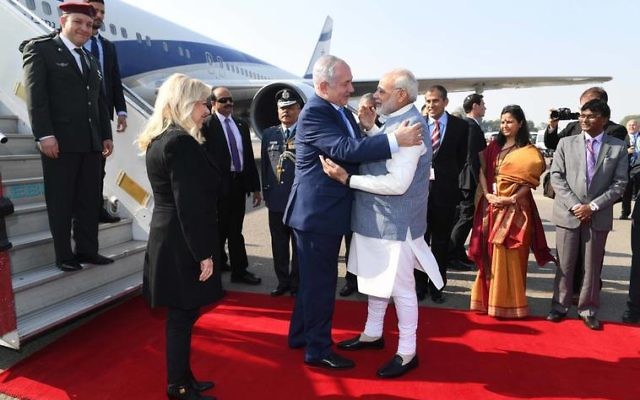Bibi visit boosts India-Israel relations
India's 1.3 billion citizens received a strong message from their Prime Minister this week: their future is bound up with Israel. Benjamin Netanyahu visited India, and received a hero's welcome.

INDIA’S 1.3 billion citizens received a strong message from their Prime Minister this week: their future is bound up with Israel.
Benjamin Netanyahu visited India, and received a hero’s welcome.
Barely an hour passed when he didn’t refer to Indian PM Narendra Modi as his “friend” – and the warmth was quickly reciprocated.
For an Israeli leader who is desperate to nurture new alliances as tensions dominate some old alliances, it was a dream trip.
Modi surprised Bibi with a personal welcome on the tarmac, and they were joined at the hip for much of the five-day visit.
Both men also used social media to show pictures of them embracing.
Just a few years ago, India downplayed its ties to Israel and revered the Palestinians.
But all that has changed, especially since Modi took office in 2014.
During this trip, which follow’s Modi’s visit to Israel last year, there was hardly any talk of the Israeli-Palestinian conflict, but lots of enthusiasm for almost every other aspect of Israel, from security to innovation.
They signed agreements boosting cooperation in a range of sectors from cinema to aviation, and from gas to cyber-security – developments that made up, in Israeli eyes, for the recent cancellation of a $630 million Indian order with an Israeli defence company.
They also paid tribute to Indian soldiers who fought in a key World War I battle for the British in Haifa, which helped to build on the gains that the Anzacs made at Beersheba.
The Battle of Haifa took place on September 23, 1918, and was key to consolidating British gains in the Palestine campaign.
And there was a very contemporary commemoration, for an event that united Indians and Israelis in sorrow.
Netanyahu paid respects to the victims of the 2008 Mumbai terror attacks – accompanied by a survivor from the incident, the Israeli 11-year-old whose parents were killed in the attack but who was carried to safety. For Moshe Holtzberg, the son of Chabad’s emissaries at the time, it was a first return to India since the attack.
If Israeli technology permeates India’s massive economy today, “even the sky is not the limit for what we may achieve together,” Modi said at an India-Israel business summit.
Israeli entrepreneurs have “made Israel a strong, stable and innovative economy,” and “made a country of eight million people shine as a global power-house of technology.”
Together with Netanyahu he launched a joint Israeli-Indian innovation fund, and declared: “India’s development agenda is huge. It presents a vast economic opportunity for Israeli companies. I invite more and more Israeli people, businesses and companies to come and work in India.”
As Modi heaped praise on Israel, Netanyahu enthused about his hosts. “I believe in India deeply,” he said. “I believe in India because I know your heritage, your culture, your ingenuity, your creativity, your humanity, your passion. You have brilliant people in India… We have brilliant people in Israel. And what we can do together is shape the future.”
During a meeting with Modi, Netanyahu said: “We are ushering today a new era in our relations. We’ve had diplomatic relations for 25 years but something different is happening now because of your leadership and because of our partnership.”
NATHAN JEFFAY

comments